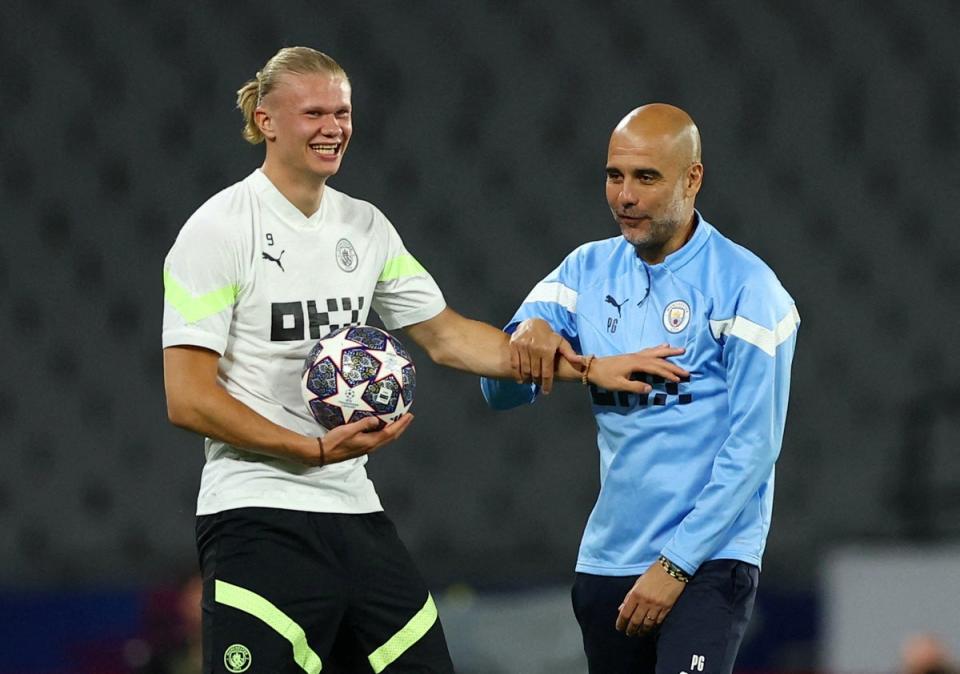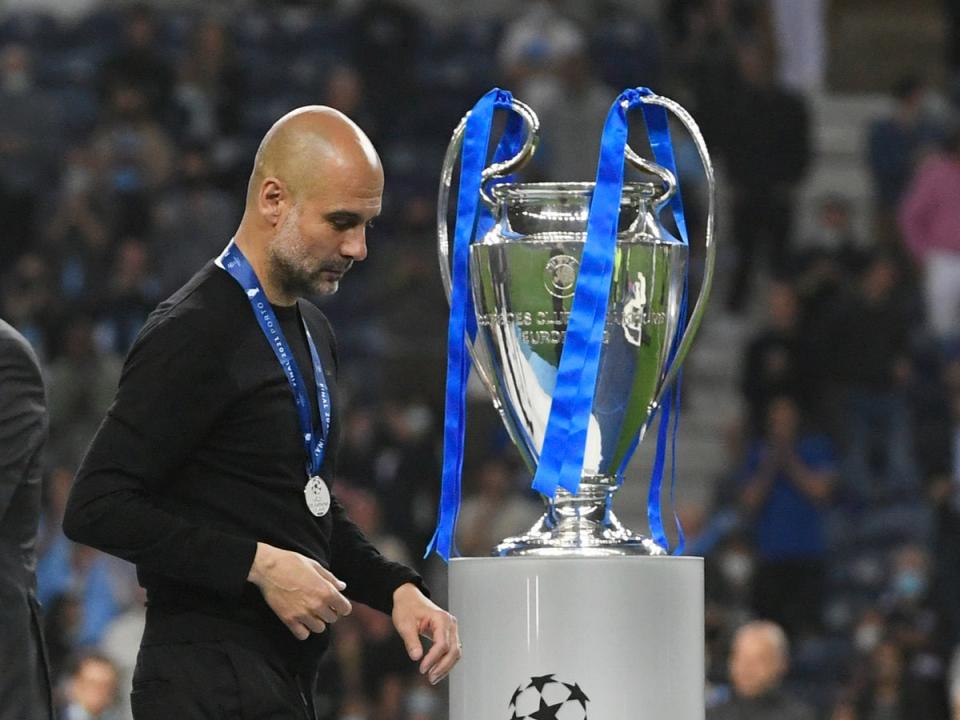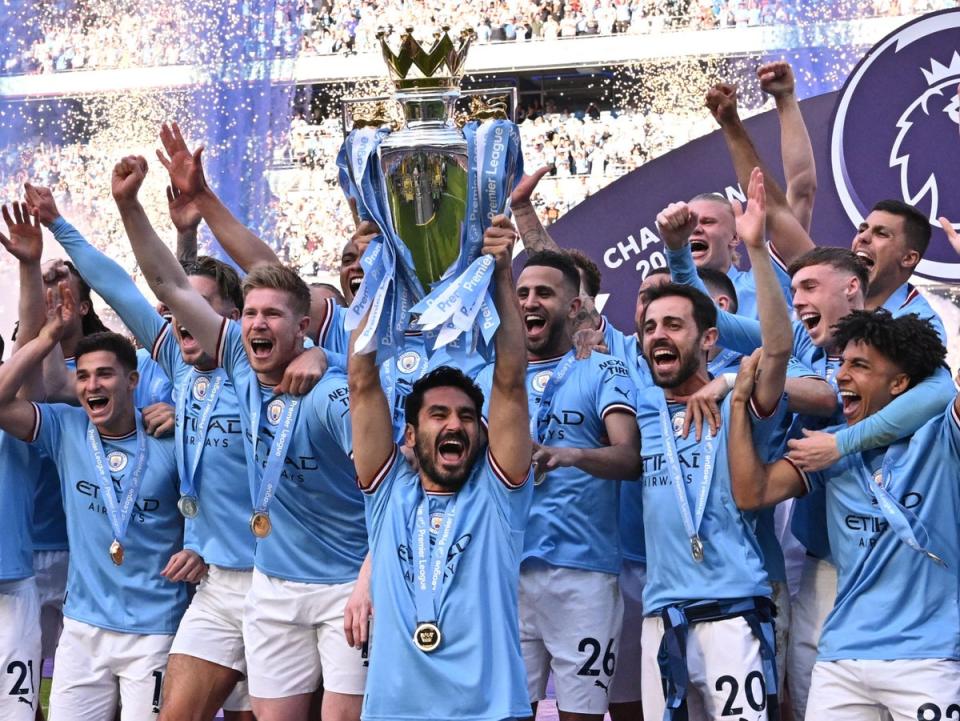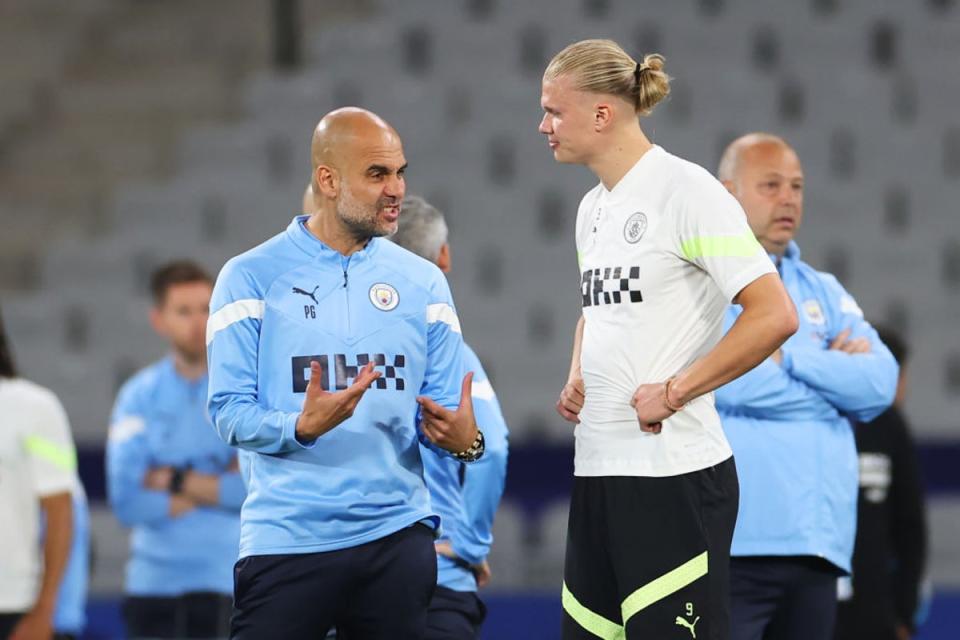One last wrong to right? Man City stand on the brink of complicated history

In Manchester City training sessions, the staff can already sense the same mood that was so striking before the games against Arsenal and Real Madrid. There is that “right kind of conviction”, that is so specific to the circumstances of the fixture. For the 4-1 over Arsenal, it was the aim of reclaiming the title they felt was theirs. For the 4-0 over Madrid, it was revenge for what happened at the Bernabeu last season.
Now, it is the memory of 2021, and finally putting right what has always gone so wrong in the Champions League. That focused intensity can be seen in the players, above all Kevin De Bruyne. The feeling is that City will come out at thFce Ataturk Stadium with full fury, and not give Internazionale even a chance to settle, let alone get on the ball.
If that is the case, it could well be worse than either Arsenal or Madrid. The 68th Champions League final could even be one that surpasses the four-goal victories of 1960, 1989, 1994 and the 1974 replay. It’s hard not to think City could render it a procession by the first half-hour, just as they have done so often in the last three months.
What Simone Inzaghi is banking on, though, is if that doesn’t happen. If it gets to even 25 minutes and Inter have dug deep to not let City in, there is the chance that doubt could creep back in; that it could feel like it's going to be another of those nights; that there is something about this competition that is now fated for Pep Guardiola.
That is when we might see one of those occasions when players like Alessandro Bastoni and Andre Onana stand defiant, when Inter display the kind of emotional intensity that characterised their own last victory in the Champions League, in 2010.
That is when we might have a game, rather than a last formality to be fulfilled for City.
It says much, however, that so much of the discussion around whether Inter can win ultimately goes to the nebulous; to football’s inherent capacity for unpredictability.
City have already done quite a job of brutalising that concept this season, just as they have brutalised most of the best opposition.
That has been just one factor in making this the most mismatched final since at least 2002 and that between Real Madrid and Bayer Leverkusen, but probably even much further back.

Inter may be one of the great European names, aiming for their fourth Champions League, but they can only be described as a good team at best. That has meant they have defied a lot of modern football norms to even get this far.
By contrast, City are the most lavishly funded project the sport has yet seen, to the point a feat as traditionally elusive as the treble now almost seems an inevitability. The club’s hierarchy have certainly planned it like that since the 2008 takeover. While the first decade was intended to provide the platform to win repeat Premier Leagues, the second has been intended to win repeat Champions Leagues. City now stand on the brink of the club’s first European Cup, and becoming the 23rd different name on the trophy.
That will be celebrated with relish and relief by a group of superb players who have been through a lot. The club and Guardiola may have a long history of frustration in the Champions League, but the depth of feeling has partly been because they have so often been the best side in Europe. City should have lifted the trophy in 2018, 2019, 2021 and 2022, and in 2020 certainly shouldn’t have lost to Lyon. The wider point is that a feat of this scale could have easily happened in almost any of those years. And if it doesn’t happen this year, it could well happen next year. Or the year after that.

It would still be wrong not to admit that 2023 is as good a chance as City will ever have to win it, certainly in this way. And if the Champions League final is itself an occasion that naturally serves as a barometer for where the game is, few bring together as many strands as this one in Istanbul.
The time and place are telling, especially as regards the use of the game by political and financial influences. President Recep Erdogan’s government finally gets its grand showpiece after two Covid-enforced postponements, but amid criticism for “democratic backsliding”. Uefa had no confirmed guest list as of Friday evening, but it was understood that invitations were extended to several heads of state. One of those who was reported to have accepted, to congratulate Erdogan on his election win, is United Arab Emirates president Mohamed bin Zayed. He is the elder brother of City’s named owner Mansour bin Zayed Al Nahyan, although the club is now widely seen as an Abu Dhabi “sportswashing” project.
It would be a historic landmark for a state club to finally win the European Cup. It also wouldn't necessarily be for the good of the sport. This is very different to the City that historically charmed the sport, or even their great title winners of 1968.
Many have raised related issues about Inter, though, since financial issues of the past few years have ensured the club is part-owned by the Chinese state through a holding company. That may not be for reasons of “soft power” or “sportswashing”, and there is no influence, but it should feed into an ongoing debate about the ownership of football clubs and where the game is going in that regard.

For this final, it has created another strand that reflects so much about the state of the sport in 2023. That is a huge financial gap, of the type that has now economically tiered football to an unprecedented degree, and fed into the very erosion of unpredictability that makes a City victory feel so likely.
The game is meanwhile facing a series of legitimacy issues, one of them involving the potential European champions. City have been charged with 115 breaches of the Premier League’s Financial Fair Play rules, to go with Barcelona being charged regarding payments to former referee Jose Maria Enriquez Negreira and Juventus having 10 Serie A points deducted in a new ruling by the Italian football federation’s court after an investigation into the club’s transfer dealings found evidence of false accounting.
Such complicated stories are a long way from the elemental glory this grandiose fixture has traditionally conjured.
This is where we are. The current players and managers would of course say that all they can do is go out and perform “on the pitch”.
That is where there is still some intrigue to a fixture so many see as a foregone conclusion. Guardiola has after all undercut foregone conclusions in the past by overthinking. Back in 2021, the final that frames so much of this, Thomas Tuchel was “shocked” when he got the City team sheet on the Chelsea bus and saw there was no defensive midfielder on the screen.
It has this week led to some jokes among the City players and staff for Guardiola not to do similar. The Catalan even acknowledged this with a laugh on the club’s media day. It just shouldn’t be an issue this time.
Guardiola has never been so clear on his team. This is, despite 52 goals, maybe the main value of Haaland. It is so obvious where he has to play that Guardiola ultimately worked back from that to come up with a formation that has made City almost unstoppable. It fittingly involved going back to the Catalan’s football roots, too. After hours in front of screens, Guardiola realised the way to maximise his attack with Haaland was to introduce the “defensive box” that Johan Cruyff did to win Barcelona their first Champions League in 1992.


The current City manager played at the top of that. It gave him his only Champions League medal as a player and may now give him his third as a manager, bringing so much full circle.
That is, of course, unless Inter square that circle.
While it would obviously be preposterous to say Inzaghi’s side are the last that City would want to face, they do have qualities that pose very specific challenges to Guardiola’s approach. The Catalan and his staff always seek to impose their game on any team but with very specific adaptations for the opposition within that. Inzaghi has made that difficult because Inter are almost a throwback in how they constantly adapt to the opposition to such an extreme degree. The manager never plays the same way twice, in the words of those within the squad.
Inzaghi knows this game is only really going to go one way, and probably quite furiously from the off. The vast majority of the match will take place within 30 metres of Onana’s goal. That is where Haaland may prove his most symbolic value, as he offers that finish that City have so often lacked on such occasions.
It is also why one of Inter’s main defensive approaches will be to draw the Norwegian into physical battles so as to distract him.
Inzaghi does have plenty of individuals who can stand up in such ways. There are a lot of “old warriors”, ready to rise to the occasion or looking for some kind of redemption. Much will revolve around two forwards with so much knowledge of the Premier League, in former Manchester City striker Edin Dzeko and the on-loan Romelu Lukaku. The Belgian was lampooned for his World Cup performances but they were a product of rushing back too quickly. The flip side is that he is now in his best form since leaving Inter the first time.

Lukaku is one player who is capable of wreaking havoc in the space left by City. Federico Dimarco is then capable of suddenly surging in out of nowhere.
This is all what Inzaghi is seeking to play on, as he gets his team to focus on their own qualities rather than fixate on City’s.
Inter certainly aren’t looking at this as an occasion they should just be happy to be involved in again. They are enjoying a real momentum from this run, going right back to an extraordinarily difficult group, and see themselves as a classic Champions League team. That means they see themselves as winners.
Most people looking on can’t see anything other than a City victory. Judging from the atmosphere around Istanbul compared to previous finals, it is difficult to remember one where there was so little sense of contest, if not occasion. That might all just be set-up, though.
This stadium’s only other Champions League final offered up the greatest sensation in the competition's history, with Liverpool's 3-3 comeback against Milan in 2005. This one might similarly display football’s eternal ability to amaze us. Or, it might be a landmark for how it’s going in the future.

 Yahoo Sports
Yahoo Sports 